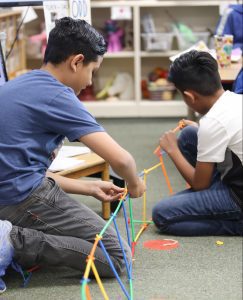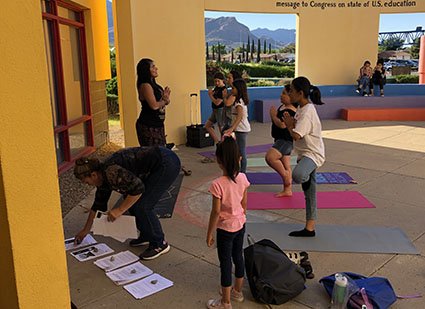ConnectEd
Over 15 million children have been diagnosed with a mental, emotional, or behavioral condition—and depression and anxiety are on the rise. We make sure social-emotional health is a priority and kids grow up with safe and nurturing environments.
Strong emotional health is vital for ensuring kids develop positive relationships, healthy coping skills, and responsible decision-making abilities. It impacts a child’s entire well-being from adult and peer interactions to risk behaviors to attitudes toward school and other activities. Focusing on social-emotional health means giving kids the confidence and skills to build resilience and to cope with and manage stress, anxieties and risk in a healthy way.
 But about 60 percent of students do not receive treatment for their mental and emotional health struggles. Due to stigma and lack of access to care in various communities across the U.S., school becomes the only place where many kids can get help. This means that schools should strive to be culturally responsive, supportive environments that focus on the whole child and recognize the importance of their emotional needs. In addition to having counselors and social workers on staff, schools should incorporate social-emotional learning into curriculum and into classroom and disciplinary practices.
But about 60 percent of students do not receive treatment for their mental and emotional health struggles. Due to stigma and lack of access to care in various communities across the U.S., school becomes the only place where many kids can get help. This means that schools should strive to be culturally responsive, supportive environments that focus on the whole child and recognize the importance of their emotional needs. In addition to having counselors and social workers on staff, schools should incorporate social-emotional learning into curriculum and into classroom and disciplinary practices.
Our ConnectEd program is a comprehensive approach to social-emotional health and youth risk behavior prevention that aims to improve and maximize the protective factors integral to a child’s health and wellbeing to promote resilience among children and adolescents, help promote social and emotional competence, and minimize risk behaviors. The key components of our ConnectEd program model include:
- CASEL-aligned, evidence-based curriculum that uniquely addresses social-emotional health from an equity-centered, whole child perspective by leveraging family-school partnerships, physical activity and nutrition as vehicles for age-appropriate foundational social-emotional learning and risk-behavior prevention.
- Culturally responsive and age-appropriate experiential learning initiatives that demonstrate mindful awareness practices and/or restorative practices via a district-wide or selected school-cohort approach. Experiential learning initiatives are designed to promote “learning through reflection on doing” and to create opportunities for students to apply skills and knowledge learned within the context of their community, cultural background and own lived experiences. Learn more about what experiential learning initiatives look like in action with ConnectEd.
- Capacity-building learning sessions around social-emotional health best practices and strategies to promote and enhance the ecological assets of students to build improved social-emotional competencies and support emotional health and responsible decision making through the trajectory of childhood and to build their capacity to serve as nurturing adults in their school communities to champion positive youth development.
What is AFHK doing?
ConnectEd is implemented as a part of our holistic family-school partnership model. We do this by:
- Building strong family-school partnerships that enhance individual and collective capacity to serve as trusted nurturing adults for children and implement sustainable programming to support social-emotional learning and risk behavior prevention at school and at home.
- Providing district-wide training and support to improve district-level policies and practices that strengthen the social-emotional climate and promote positive staff wellness initiatives, implement new initiatives and programs that promote the connection of physical activity and nutrition with social-emotional health and build opportunities for developmentally-appropriate social-emotional learning, responsible decision-making and character development.
- Creating resources and activities that children, caregivers and school staff can use at home or at school to promote social-emotional learning, skills development, and the mind-body connection.
- Establishing comprehensive social-emotional health hubs through grant funds, professional development, technical support and implementation of social-emotional learning and risk behavior prevention best practices. A comprehensive social-emotional health hub is a school that provides the following:
- Safe and supportive learning environments for students to explore, develop and foster behaviors that will support lifelong social-emotional learning and risk behavior prevention;
- Opportunities for students to explore and learn the mind-body connection between social-emotional health and physical activity and nutrition;
- Equitable and inclusive social-emotional health opportunities and initiatives, representative of the unique strengths of the school community, co-created and/or co-led by families and caregivers.
How you can help:
No matter who you are, you can help make sure kids are spending more time moving and seeing the all-around health benefits of being physically active.
- Donate today to support our work helping kids grow into responsible, caring young adults.
- Partner with us to provide social-emotional health resources and initiatives to the schools that need it most.
- Learn more about how you can make an impact on social-emotional health as a parent or caregiver.
- Explore our resources to see how you can help kids get to know their emotions and what to do with them.
Unique School Spaces Offer Joy, Freedom, and Health to Students and Community

Whitaker Elementary School is truly a space that benefits everyone thanks to parent and community input, volunteering, and work that helped build a “Be Hive” to transform students’ social emotional health. Learn more about how they promote experiential learning and mindfulness.
Read their storyOpens in new window
Get Inspired
For more articles about how schools and parents across the country have improved kids’ health through social-emotional learning, view our success stories.